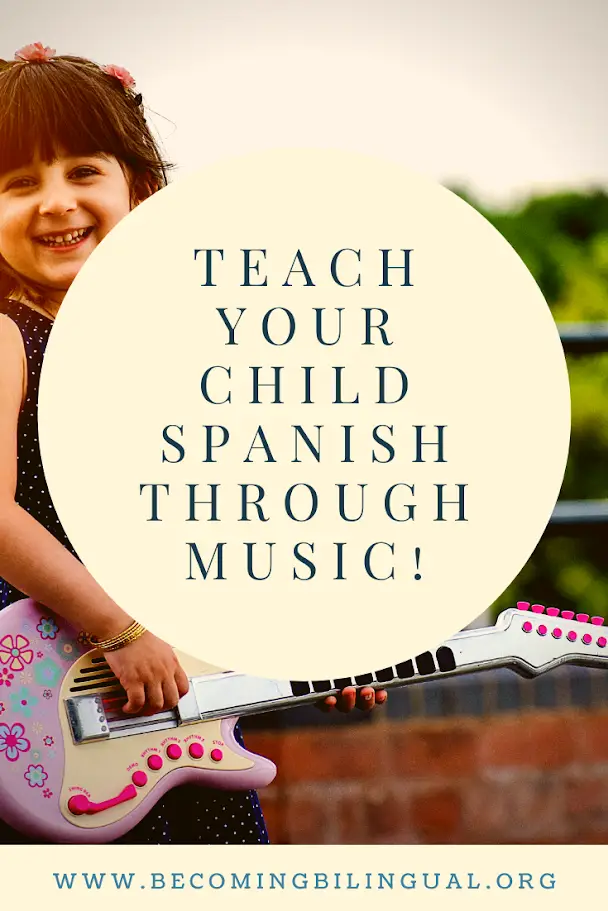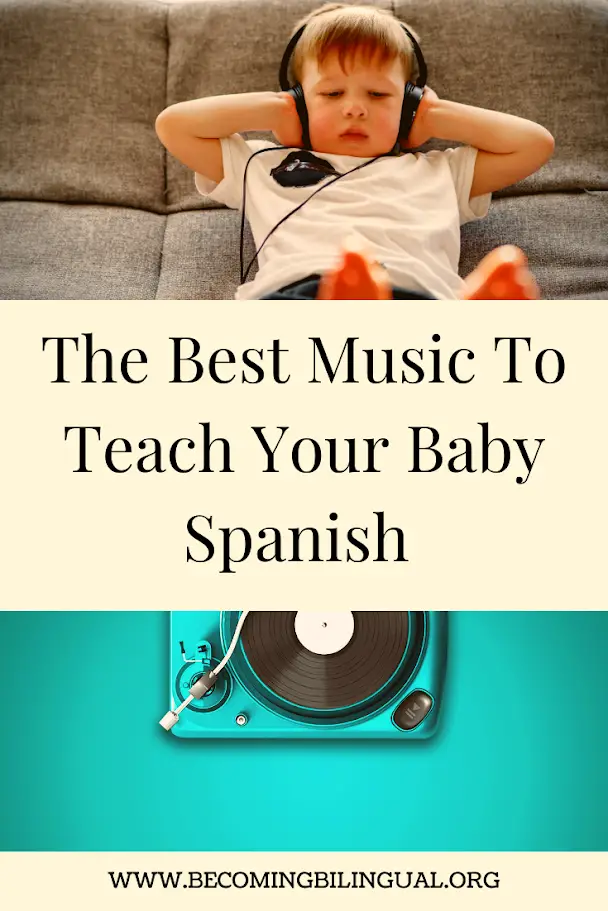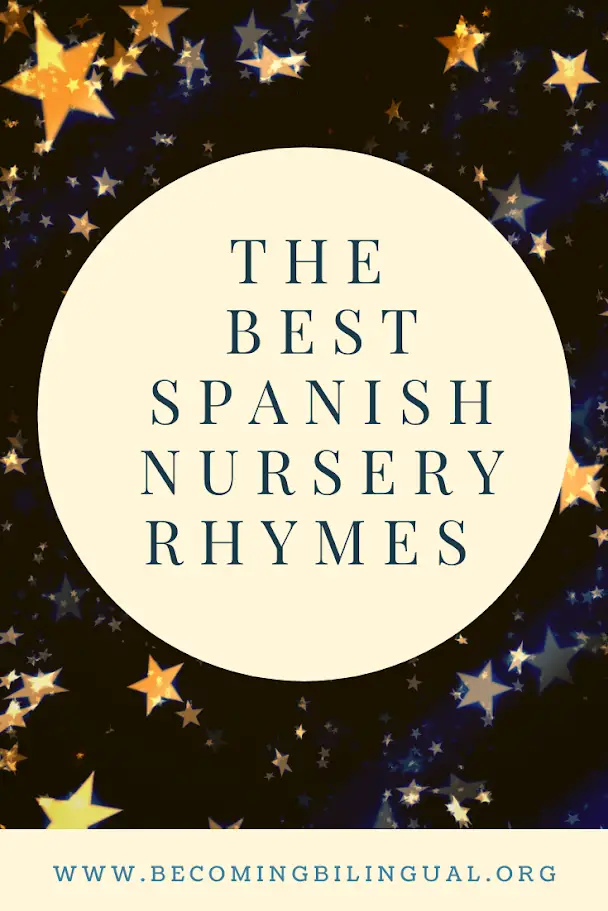Wonderful Nursery Rhymes That Will Make Your Baby Bilingual

Last Updated on January 18, 2021 by Reina Victoria
Nursery rhymes are a great way to enjoy time with your child and they’re also a great way to work on building language skills. Nursery rhymes are an important step in language development for kids.
When children listen to nursery rhymes, they are building so many listening skills including an awareness of rhyming, syllables and alliteration. When you and your child are listening to nursery rhymes in Spanish, you’re working on your Spanish language development in all of these ways as well.

Table of Contents
Why use Spanish nursery rhymes:
If you’re raising your child to be bilingual then nursery rhymes are a great place to start. One of the best parts about nursery rhymes is that they’re appealing to younger children, including infants.
When my daughter was a baby, I found that it was hard to always be talking in Spanish around her since it was just the two of us in the house all the time. I would just be talking to myself, and since Spanish isn’t my first language, it felt awkward and forced. Singing Spanish nursery rhymes was a great way to make Spanish language happen.
As a non-native Spanish speaker, I used Spanish nursery rhymes with my daughter as much as I could. Not only did I want my daughter to be exposed to as much Spanish as I could, I also wanted to build my own Spanish fluency and nursery rhymes can be great for that.
We listened to nursery rhymes in the house and also in the car when we were on the move. Repeated listening and memorization the keys to using Spanish nursery rhymes and getting the most benefit from them.

Here’s how I used nursery rhymes to boost our Spanish:
Since many nursery rhymes are short and catchy, they are often easy to memorize. After a few repetitions in the car, I would memorize all of the nursery rhymes that I’d downloaded for my daughter.
Being able to sing along and repeat the words helped improve my pronunciation of Spanish words. As my daughter got older, she was also able to easily sing along with these songs, making them some of her first phrases and songs that she sung independently.
Singing along with nursery rhymes also provided me with a lot of practice for speaking Spanish without fear. One of my greatest worries as a non-native speaker is that I’m speaking grammatically incorrect Spanish with my daughter.
I obviously want her to be hearing a high quality of Spanish language at all times and I would be afraid of making mistakes, especially with my verb tenses. When you’re singing a song, especially one that you’ve memorized, you can feel confident in the Spanish that you’re speaking.
Since my own Spanish was much lower when my daughter was first born, I also used nursery rhymes to add more Spanish vocabulary to everyday situations that we were in. For example, at night if we saw the stars I could say, “Mira, estrellas!” and then sing, “Estrellita donde estas?” to build upon the moment, since there wasn’t much else I could say about stars in Spanish.
Being able to sing a song that I’d memorized gave me another opportunity to add in Spanish language when I lacked the grammar and vocabulary to say more.
Using nursery rhymes to expand upon situations also helped to build context for my daughter and make meaning with the language. When we sang “Estrellita donde estas?” and looked at the stars, it was helping her to make a connection with the song and the words, making it more meaningful that if we were just randomly singing it in the car.

So where did I find our Spanish nursery rhymes?
The first Spanish nursery rhymes that I found were from Little Baby Bum. Little Baby Bum is popular in its English version and has a huge following on YouTube and Netflix. It also has great translations in Spanish as well as many other languages.
Almost all of the nursery rhymes on Little Baby Bum are songs that are adapted or translated from English nursery rhymes and few of them are authentic or traditional Spanish nursery rhymes.
If you’re looking for traditional Spanish nursery rhymes, you can check out Hispanic Mama who writes about them here: 15 Traditional Nursery Rhymes In Spanish or check out my post on “Guia Infantil” which has a huge collection of traditional nursery rhymes.
One of the things that I appreciate about the nursery rhymes from Little Baby Bum is the amount of songs that they have to go along with daily routines.
These are great to use around the house to embed more Spanish into your day and to help your kiddo get a feel for the language. I would look up songs that were about brushing teeth, cooking, or cleaning up.
Not only would these boost our Spanish vocabulary but they also made the songs more meaningful.
For more nursery rhymes in Spanish check out this post here!
3 Charming Nursery Rhymes To Boost Your Baby’s Spanish
Here are our favorites Little Baby Bum nursery rhymes…
“Asi Es Como Se Lavan Los Dientes”
This was a great one that we listened to and that I memorized to use for when we brushed our teeth:
“Lluvia Lluvia Vete Ya”
Whenever it was raining outside we sing, “Lluvia Lluvia Vete Ya”. It’s a nice translation of the English nursery rhyme and easy to memorize to use when you want it:
“Ordena Tu Habitacion”
“Ordena Tu Habitacion” is our go to clean up song! It’s nice to use throughout the day and can easily build some more vocabulary for around the house:
Looking for more Spanish music? Check out these posts about Spanish music for kids!
10 Spanish Songs That Will Excite Your Kids!
Authentic Spanish Songs That Are Teen Approved
5 Approved Spanish Songs Your Big Kid Will Love!
Try a few nursery rhymes to listen to and see what your child likes. Singing them will help both you and your child get a feel for the language and help to build a foundation for learning more Spanish!
Which one did you like best? Let me know in the comments!
Happy Learning!
Don’t forget to subscribe here to get the latest posts and resources delivered straight to your inbox!
8 thoughts on “Wonderful Nursery Rhymes That Will Make Your Baby Bilingual”